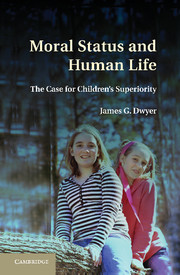Book contents
- Frontmatter
- Contents
- Introduction
- 1 What Is Moral Status and Why Does It Matter?
- 2 How Is Moral Status Determined?
- 3 Selecting Criteria of Moral Status
- 4 Problems in Applying a Multicriteria Approach
- 5 Applying a Multicriteria Moral Status Test to Adults and Children
- 6 Legal, Policy, and Moral Implications of Children's Superiority
- Conclusion
- Bibliography
- Index
2 - How Is Moral Status Determined?
Published online by Cambridge University Press: 10 November 2010
- Frontmatter
- Contents
- Introduction
- 1 What Is Moral Status and Why Does It Matter?
- 2 How Is Moral Status Determined?
- 3 Selecting Criteria of Moral Status
- 4 Problems in Applying a Multicriteria Approach
- 5 Applying a Multicriteria Moral Status Test to Adults and Children
- 6 Legal, Policy, and Moral Implications of Children's Superiority
- Conclusion
- Bibliography
- Index
Summary
Few people ever stop to ask themselves: “Why do I matter morally? Why should anyone else treat me with even the most basic or minimal respect? Why should the government take my interests or wishes into account in its decision making?” We take for granted that we are morally significant beings and that others owe us moral duties – at the least, negative duties to forbear from harming us in various ways. Our moral status seems self-evident, perhaps just because we grew up in a culture that treats all people as morally important, and in fact as the most important type of beings on earth. We might find it quite difficult to articulate exactly why we are of any moral significance.
Were we to ask ourselves these questions, one answer that might come to mind is that we all just agree to respect each other. I am owed respect because I respect others, and my interests count because I acknowledge that others' interests count also. On further reflection, though, this contract-invoking answer is likely to prove unsatisfying as an explanation of our moral considerability. For one thing, it would seem to imply that any being incapable of giving respect is thereby rendered undeserving of receiving any moral regard. I generally do not place much weight on settled specific intuitions, but I suggest at the outset that any theory of moral status that implies infanticide does no wrong to an infant (who cannot now and might never become able to assent to a moral contract) or that torturing a dog (who will never so assent) does no wrong to the dog would need an exceedingly strong argument in its favor to appear plausible.
- Type
- Chapter
- Information
- Moral Status and Human LifeThe Case for Children's Superiority, pp. 27 - 60Publisher: Cambridge University PressPrint publication year: 2010



